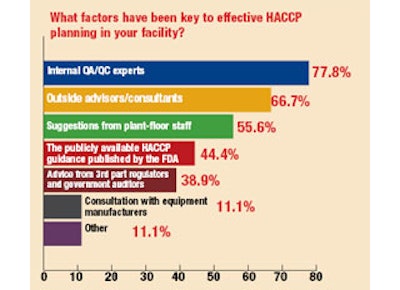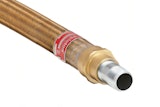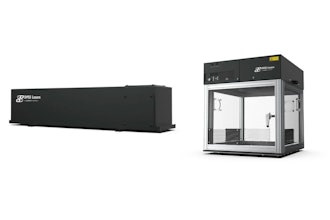
This article originally ran in the March 2013 issue of Food Manufacturing.
The Food Safety Update section of Food Manufacturing is designed to offer our readers insight into the state of food safety concerns across the industry. We received hundreds of responses to this month’s survey on juice processing.
This month Food Manufacturing surveyed its readers involved in the beverage processing industry to find out the state of their food safety concerns amid evolving regulations and persistent food safety challenges.
Because of the biological nature of juice products, juice processors must be hyper-vigilant in ensuring proper food safety procedures are in place. Before the Food Safety Modernization Act (FSMA) mandated HACCP planning across all food industry segments, the juice industry stood alongside meat, poultry and seafood as one of the only food processing segments required to write HACCP plans. Though HACCP plans are now mandatory for all food facilities, juice processors still face a unique set of food safety challenges.
Much like Food Safety Update surveys of other food industry segments have shown in the past, juice processors are quick to welcome food safety regulations. When asked about the wisdom of FSMA-mandated HACCP plans across the food industry, beverage processors indicated:
- All food industry segments should be required to write and implement HACCP plans—88.9%
- HACCP planning should be mandatory only in the industries for which it has been mandatory in the past (meat, poultry, seafood and juice)—11.1%
None of the respondents indicated a belief that “HACCP planning should not be mandatory for anyone.”
And, as we’ve seen in other industries, beverage processors are not only satisfied with the tightened HACCP regulations that are being rolled out industry-wide, but they’re also satisfied with the guidance provided to their own facilities. As seen in the chart at left, an overwhelming majority of beverage processors indicated approval of the FDA guidance provided to beverage processors.
55.6 percent of survey respondents reported processing a combination of beverage products — some juice and some-non-juice products. Of those who reported processing both juice and non-juice beverages, 44.5 percent said their facility maintains separate HACCP plans for each. As seen in the chart at right, beverage processors, like their counterparts in other industry segments, rely on a number of resources to ensure that these plans meet the needs of their facilities and customers. Of those respondents who indicated consultation with “other,” most clarified that they sought guidance from upper management or directly from customers.
Respondents to this survey were asked an open ended question: “Why do you think that, until recently, juice was the only non-animal food product to have HACCP planning mandated? Do you think this distinction is reasonable?” As was the case last time a survey of this segment of the Food Manufacturing readership was published (June 2012), responses overwhelmingly indicated that the distinction was appropriate and that the mandate likely stemmed from several high-profile juice contaminations that occurred in the 1990s. Many respondents also noted that the bioactive quality of juice products make them particularly susceptible to contamination, which, according to most readers, justifies more comprehensive food safety mandates.
The FDA recently published new rules that will require farmers to employ stricter sanitary standards at the farm level. These rules have been seen as a response to the many produce-related recalls. As displayed in the chart below, when asked about how these new farm rules will affect business, most beverage processors saw little impact ahead. Of the 29.4 percent who said the rules would affect them, most focused on the benefits of better quality, safer ingredients rather than the possibilities of increased operational costs at farms being passed down to their facilities.
Beverage processors continue to update safety procedures in their own facilities. A third reported updating HACCP plans annually, with over half noting that HACCP plans are under constant revision in their facilities. Only about 11 percent noted HACCP updates coming less than once per year.
Though under somewhat stricter scrutiny than other industry segments, beverage processors are open and responsive to regulations, which they overwhelmingly report to support. The FDA rulemaking process allows for public comment from both consumers and industry. Perhaps because of the nature of this process and the input allowed from processors, final regulations seem to be tailored appropriately to industry needs, according to beverage processors themselves.























